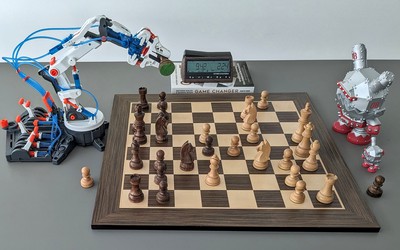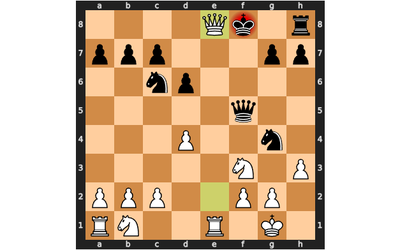
Winning Probabilities in Chess
Winning Probabilities in ChessIntroduction
There is an ongoing discussion in the chess community about how likely is is to score 45.5 out of 46 blitz games.
I decided to write this post because it seemed to me that there is a general lack of understanding of statistics.
In this post I discuss two theoretical players, a player A rated 3300 and a player B rated 2950, and try to determine how likely the result 45.5/46 is.
I tried to do the formulas in a way that it is possible to copy and paste them into a spreadsheet.
For those who don't know the symbol ≈ means approximately equal.
Elo and winning probabilities
This section was written based on the Elo section on the Wikipedia page.
According to the Elo rating system the expected score of a Player A against a Player B is:
Player A expected score = 1/(1+10^(-(RA-RB)/400)).
The 10 comes from using a logistic curve with base 10 for the expected score of player A.
The 400 results from the determination that a 200 difference rating points should result in a expected score of 0.75.
If RA-RB=200, Player A expected score = 1/(1+10^(-(200)/400)) ≈ 0.7597
Note that the proportion of wins/draws/losses is not determined, but a draw is considered half a win and half a loss.
To be able to determine the number of draws included in the score the following formula was proposed:
Player A expected score = (10^(r/400))/(10^(-r/400)+k+10^(r/400)), where r=(RA-RB).
If k=2 and r=200 then player A expected score will be 0.7597 as before.
Player A winning score = (10^(200/400))/(10^(-200/400)+2+10^(200/400)) ≈ 0.5772
Player B winning score = (10^(-200/400))/(10^(200/400)+2+10^(-200/400)) ≈ 0.05772
Player A drawing score = (1-(0.5772+0.05772))/2 ≈ 0.365/2 = 0.1825
Player A expected score = 0.5772+0.1825 = 0.7597
These scores can be interpreted as probabilities. For k=2, the probabilities of Player A rated 3300 winning/drawing/losing against player B rated 2950 are:
P(A winning) = (10^(350/400))/(10^(-350/400)+2+10^(350/400)) ≈ 0.78
P(B winning) = (10^(-350/400))/(10^(350/400)+2+10^(-350/400)) ≈ 0.01
P(A and B drawing) ≈ 0.21
I will use this probabilities for the remaining of this document.
Brief combinatorics
Combinatorics is essentially the mathematics of counting.
To calculate the probability of the 45.5/46 scores it is necessary to count all the ways in which this score could have occurred.
The following example explains how that counting is done.
Let's consider a smaller example where a match of 3 games is played. There are 3^3 = 27 different possible outcomes as follows:
| Game 1 | Game 2 | Game 3 |
|---|---|---|
| w | w | w |
| w | w | d |
| w | w | l |
| w | d | w |
| w | d | d |
| w | d | l |
| w | l | w |
| w | l | d |
| w | l | l |
| d | w | w |
| d | w | d |
| d | w | l |
| d | d | w |
| d | d | d |
| d | d | l |
| d | l | w |
| d | l | d |
| d | l | l |
| l | w | w |
| l | w | d |
| l | w | l |
| l | d | w |
| l | d | d |
| l | d | l |
| l | l | w |
| l | l | d |
| l | l | l |
Some of this outcomes can be grouped since, for instance, the events (winning, losing, losing), (losing, winning, losing) and (losing, losing, winning) are equally likely.
Out of 3 games in how many ways can the event A wins 1 and B wins 2 games occur? The answer is in 3 ways:
combin(3,1) = 3!/(1!(3-1)!) = 3 = combin(3,2) = 3!/(2!(3-2)!)
where 3! = 3*2*1
In this example there are 10 groups of equally likely events:
| Wins | Draws | Losses | Count |
|---|---|---|---|
| 3 | 0 | 0 | 1 |
| 0 | 3 | 0 | 1 |
| 0 | 0 | 3 | 1 |
| 2 | 1 | 0 | 3 |
| 1 | 2 | 0 | 3 |
| 2 | 0 | 1 | 3 |
| 1 | 0 | 2 | 3 |
| 0 | 2 | 1 | 3 |
| 0 | 1 | 2 | 3 |
| 1 | 1 | 1 | 6 |
In a match of 46 games with 3 possible results there are 3^46 ≈ 8.86294E21 possible outcomes which is a bigger number than 8*10^21 (8 followed by 21 zeros).
Again many of this outcomes are equally likely so they can be grouped. For instance there are combin(46,10) = 4076350421 combinations for the event Player A wins 36 games and draws 10.
Winning probabilities in chess
Probability of a single event
A single event is for instance: in a match of 3 games player A wins 1 game and loses 2 games.
What is the probability of this event?
P(A wins 1 and loses 2 games) = 0.78^1*0.01^2*combin(3,1) ≈ 0.000234 (0.0234%)
What is the probability of player A winning 2, 3 or 4 games in a row?
P(A winning 2 games in a row) = 0.78*0.78 = 0.78^2 = 0.6084
P(A winning 3 games in a row) = 0.78*0.78*0.78 = 0.78^3 = 0.47552
P(A winning 4 games in a row) = 0.78*0.78*0.78*0.78 = 0.78^4 ≈ 0.37015
What is the probability that player A wins 45 and draws 1 game out of 46 games match?
P(45.5/46 score) = 0.78^45*0.21*combin(46,1) ≈ 0.00013 or about 0.013%.
What is the probability of 36 wins and 10 draws out of 46 games?
P(player A winning 36 games and drawing 10 against player B) = 0.78^36*0.21^10*combin(46,10) ≈ 0.089 (8.9%)
Player A winning 36 games and drawing 10 against player B is the more likely result out of all possible results and still is relatively small.
This is not surprising as the probability of single events tends to be low when there are many events possible. The more events there are the lower it will tend to be. In fact the point probability of a continuous distribution is zero.
Therefore, often it is often more useful to consider probability of ranges or cumulative probabilities.
Cumulative probability.
Since the probability of a single event can be very low or even zero in the case of a continuous distribution, in many circumstances it is more useful to ask questions in relation to ranges of events.
For instance, what is the probability of player A winning at least 2 games out of 3?
P(A wins at least 2 games) = P(A wins 3 games) + P(A wins 2 games and draws 1) + P(A wins 2 games and loses 1) = 0.78^3*combin(3,0)+0.78^2*0.21^1*combin(3,1)+0.78^2*0.01^1*combin(3,1) ≈ 0.876 (87.6%)
What is the probability of player A winning more than 42 games in a match of 46 games? This one is too much of a trouble to calculate (and I have actual work to do), but if we simplify the problem to P(A wining) = 0.78 and the P(A not winning) = 0.22.
P(A winning more than 42 games) = P(A winning 43 games and not winning 3) + P(A winning 44 games and not winning 2) + P(A winning 45 games and not wining 1) + P(A winning 46 games) = 0.78^43*0.22^3*combin(46,3)+0.78^44*0.22^2*combin(46,2)+0.78^45*0.22^1*combin(46,1)+0.78^46*combin(46,0) ≈ 0.00475 (0.475%).
Rare events
There are may examples where events with very low probability actually happen. The most notable ones is winning the euro millions.
Hence a question could be, how many games would player A and player B have to play with each other so to be a 0.95 (95%) probability of the 45.4/46 score happening?
P(45.5/46) = 0.00013 (more or less), then the probability of the P(not scoring 45.5/46) = 1 - 0.00013 = 0.99987.
Consequently the probability of the score 45.5/46 occurring after n tries is (1-0.99987^n).
P(45.5/46)=0.95 -> (1-0.99987^n)=0.95 <=> 0.99987^n=0.05 <=> n=ln(0.05)/ln(0.99987) ≈ 23042
If Player A and Player B played about 23000 games there is a 0.95 chance of seeing a 45.46 score
Final Thoughts
My aim was to try to explain to those less familiar with statistics how one could think about the question of how likely is a score of 45.5/46.
All the calculations on this blog rely on the assumption that the probabilities of wins/draws/losses are 0.78/0.21/.01 but I have no idea if these probabilities are a good reflection of reality (a theme for another blog for sure).
If they are not then these probabilities would have to be estimated and the calculations redone.
If I made any mouse slips, keyboard slips that originated inaccuracies, errors or blunders, don't blame me, blame my cat and my son.
More blog posts by JoaoTx

Making a simple chess engine
Using python/python-chess to develop a simple chess engine
Exploring the python-chess module
Lichess' accuracy metrics replication as pretext to explore the python-chess module.